 History
History  History
History  Health
Health 10 Everyday Activities That Secretly Alter Consciousness
 History
History Top 10 Historical Disasters Caused by Someone Calling in Sick
 Animals
Animals 10 New Shark Secrets That Recently Dropped
 Movies and TV
Movies and TV 10 Forgotten Realities of Early Live Television Broadcasts
 Technology
Technology 10 Stopgap Technologies That Became Industry Standards
 Weird Stuff
Weird Stuff 10 Wild Facts About Taxidermy That You Probably Didn’t Know
 Travel
Travel 10 Beautiful Travel Destinations (That Will Kill You)
 Miscellaneous
Miscellaneous 10 Modern Marriage Rituals Born from Corporate Branding
 Weird Stuff
Weird Stuff Ten Bizarre Visions of 2026 from Fiction
 History
History 10 “Modern” Problems with Surprising Historical Analogs
 Health
Health 10 Everyday Activities That Secretly Alter Consciousness
 History
History Top 10 Historical Disasters Caused by Someone Calling in Sick
Who's Behind Listverse?

Jamie Frater
Head Editor
Jamie founded Listverse due to an insatiable desire to share fascinating, obscure, and bizarre facts. He has been a guest speaker on numerous national radio and television stations and is a five time published author.
More About Us Animals
Animals 10 New Shark Secrets That Recently Dropped
 Movies and TV
Movies and TV 10 Forgotten Realities of Early Live Television Broadcasts
 Technology
Technology 10 Stopgap Technologies That Became Industry Standards
 Weird Stuff
Weird Stuff 10 Wild Facts About Taxidermy That You Probably Didn’t Know
 Travel
Travel 10 Beautiful Travel Destinations (That Will Kill You)
 Miscellaneous
Miscellaneous 10 Modern Marriage Rituals Born from Corporate Branding
 Weird Stuff
Weird Stuff Ten Bizarre Visions of 2026 from Fiction
Top 10 Cursed Villages And Towns
The evil small town or village is a staple of horror fiction. Numerous books and films—from Stephen King’s ‘Salem’s Lot to Village of the Damned—have used the theme to maximum effect. These types of stories make us question our neighbors and our surroundings.
But what about truly cursed towns? The following locations are all believed to be centers of extraordinary hauntings, malevolent witchery, or some other form of darkness. None are for the faint of heart.
10 Al Jazirah Al Hamra
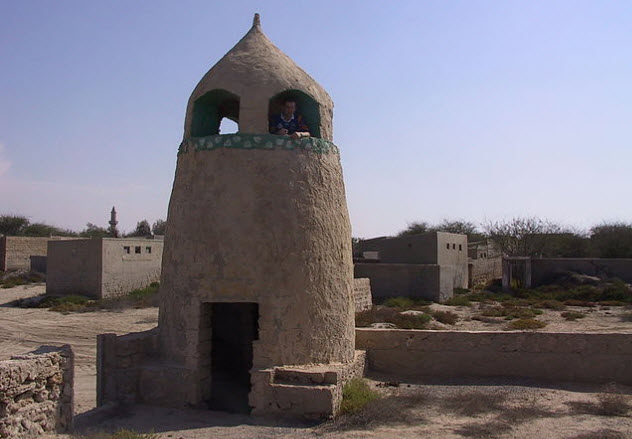
The abandoned fishing village of Al Jazirah Al Hamra is located on the northeastern tip of the United Arab Emirates (UAE). Before the oil boom in the 1960s, the village was relatively prosperous and full of quaint houses, many of which dated back to ancient times.
Through the years, the coastal village attracted Persian immigrants, Portuguese traders, and British officials. In fact, after the village was rebuilt in 1831, British records indicated that Al Jazirah Al Hamra had a population of about 4,100 people, most of whom were involved in the lucrative pearl trade.
Then, around 1968, the residents abandoned the village en masse, leaving it in the hands of itinerant workers. Many of the former inhabitants still own land in the village, but few actually live there.
Since the 1960s, Al Jazirah Al Hamra has gained a reputation as an exceedingly haunted village. Many UAE citizens believe that the village is overrun by djinns, a violent and corrupt type of fairy that haunts deserts and feeds on human flesh.
According to local horror filmmaker Faisal Hashmi, who decided to visit the village one night with some friends, the village instills a deep sense of dread. Its spectral inhabitants are also fond of leaving handprint impressions as warning signs to any living soul foolish enough to enter their territory.
Hashmi’s case is not an isolated one. Al Jazirah Al Hamra is popular among legend trippers and other nocturnal tourists who like to seek out thrills. Although some people in the area try to discourage this behavior by adamantly stating that there are no djinns in the village, many more locals have at least one djinn sighting or story to relate.
9 Bahla
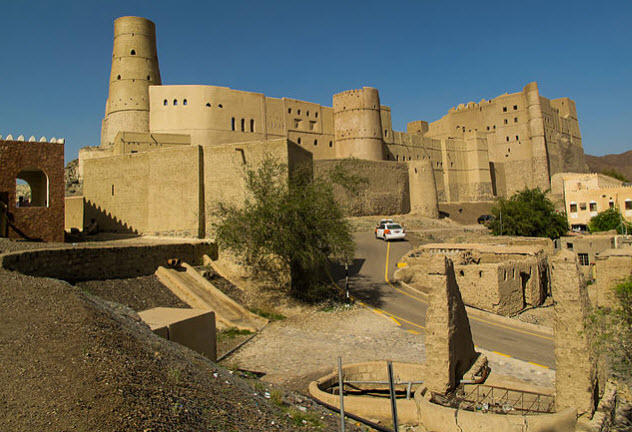
Although more religiously tolerant than most of its neighbors, Oman is still a nation with a Muslim majority that recognizes Islam as the official faith. Indeed, most of Oman’s citizens follow the Ibadi school, a strain of Islam descended from Kharijism.
In the early days of Islam, the Kharijites demanded that all Muslims follow their interpretation of the religion or face harassment or even death. In many ways, the Kharijites were the first jihadi terrorists in history.
So it is truly amazing that a place like Bahla can exist at all. Tucked away in the interior of Oman, Bahla is known as the country’s capital of black magic. Many stories about Bahla speak of such things as witches, ritual curses, djinns, and the ability of magicians to travel throughout the world without any rational means of transport.
In Bahla, one can find professional fortune-tellers, practicing occultists, and others steeped in things considered haram (forbidden) by mainstream Islam. Although this may make Bahla sound like the Salem of the Middle East, many locals truly consider the village to be a redoubt of evil that is teeming with invisible djinn hordes.
8 Cinco Saltos

Argentina’s Cinco Saltos has a black reputation. Situated in the mostly rural Rio Negro region, Cinco Saltos reportedly gets little sunlight. This pervasive gloom helps to hide the town’s many necromancers and witches from prying eyes. Apparently, there are so many black magicians in Cinco Saltos that the town is often referred to as the “City of Witches.”
Some of the more infamous stories about Cinco Saltos concern the town’s large cemetery. One story claims that workers found the body of a 12-year-old girl while renovating the cemetery. Although she had been dead for about 70 years, the girl’s body had barely decomposed due to mummification.
Weirder still, the workers noticed that someone had chained the girl’s body to her coffin. Upon hearing about the discovery, the superstitious residents of Cinco Saltos claimed that the girl’s body had been used in some sort of occult ritual by one of the town’s many covens. Soon afterward, some began seeing the girl’s ghost near the cemetery.
Another disturbing story about supernatural activity in Cinco Saltos concerns a crossing that spans Pellegrini Lake, which runs through the town. Witches once performed child sacrifices on the lake, so visitors who use the crossing at night sometimes report hearing the disembodied screams of children.
Invariably, whenever someone tries to find the source of these screams, they come back empty-handed.
7 Kuldhara
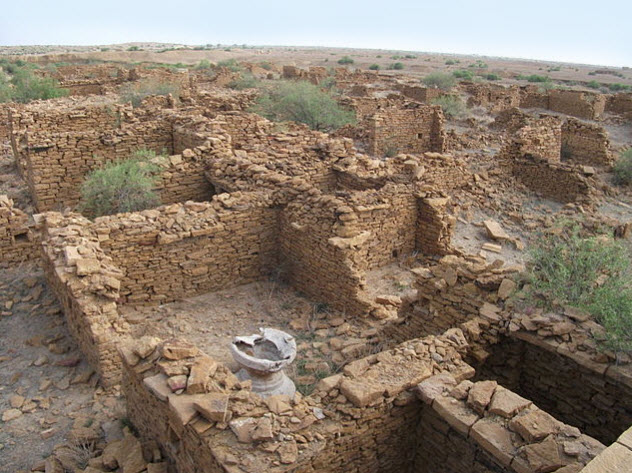
In the 19th century, all the citizens of Kuldhara, a village in the large Indian state of Rajasthan, abandoned their homes and never returned. Today, Kuldhara remains a dead city of empty homes and buildings.
According to a popular theory, the villagers all left Kuldhara as an act of solidarity with their chief, whose daughter was receiving unwanted attention from Salim Singh, the minister of Jaisalmer. When Singh issued an ultimatum to the citizens of Kuldhara, they decided to leave instead of face Singh’s wrath.
While this is probably not true, Kuldhara is still considered one of India’s most haunted locales. In 2013, the Paranormal Society of Delhi conducted an investigation to prove or disprove the many ghost stories about Kuldhara.
After 12 hours, the 18-man team left the village with several pieces of evidence. Using voice recorders and other high-tech tools favored by paranormal investigators, the team claimed that they recorded sudden temperature drops, inexplicable noises, and what sounded like disembodied voices. Furthermore, the presence of strange shadows was a constant throughout the investigation.
In a strange twist, two foreigners were spotted wandering through the village’s many abandoned houses in 1998. When the police arrived to inspect the situation, they found gold and silver items in the several bags that belonged to the strangers. Apparently, the foreigners had found the items after digging beneath the many abandoned houses of Kuldhara.
6 Dargavs
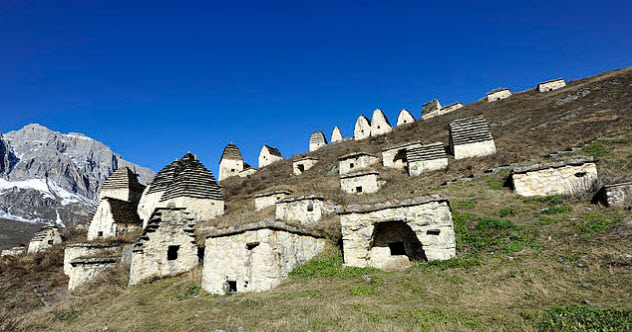
The mystery surrounding Dargavs may never be solved. Called the “City of the Dead,” Dargavs is a village located on a mountain ridge in Russia’s Republic of North Ossetia-Alania.
In truth, “village” isn’t an entirely appropriate term for Dargavs. It’s actually a sprawling, ancient necropolis. In the Middle Ages, the Ossetian (or Alanian) tribesmen who lived there decided to bury their families in crypts that were built to look like houses.
From afar, Dargavs looks like any rural settlement. But once inside one of the oddly shaped white houses, visitors quickly realize that these houses are littered with bones.
All told, Dargavs contains nearly 100 stone crypts. Many of them contain boat fragments, which is strange because Dargavs lies deep in the Caucasus Mountains and contains no navigable rivers. Supposedly, the villagers were buried with boats so that they could use them in the afterlife during their journey across a Styx-like river.
As for the living inhabitants of the region, many refuse to go near the necropolis. At least one legend states that anyone who visits the tombs of Dargavs is doomed to die. The pervasive fog that clings to the necropolis also has a way of keeping people back.
5 Trasmoz
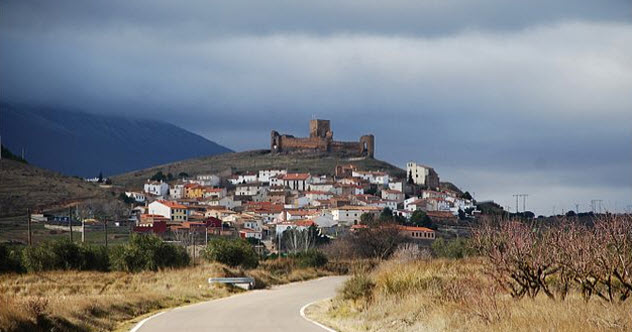
In the 13th century, the Aragonese nobles living in Trasmoz Castle decided to start a rumor. To cover up their illicit forgery operation, those living in the castle spread the word that Trasmoz, a small and isolated village in the Moncayo mountain range, was infested with witches.
In this way, the locals—who were a mix of Christians, Jews, and Muslims—would not look too hard into the loud noises that always seemed to come from the village’s many iron and silver mines.
One group that was not scared off was the Roman Catholic Church. Upset that Trasmoz did not pay any taxes to the local church authorities, the abbot of Veruela and the archbishop of Tarazona used the witchcraft rumor as justification for excommunicating all of Trasmoz.
Many years of conflict followed this injunction. However, before Trasmoz went to war with its neighbors, King Ferdinand II of Aragon decided to rule in Trasmoz’s favor and claimed that they had been treated unfairly by certain figures in the church.
Since that time, the witch myth has stuck. Even today, the village—which has only 62 residents—is still known as one of Spain’s witchcraft centers. In the annals of Spanish legend and folklore, the Castle of Trasmoz is frequently cited as a great bastion of satanism and black magic.
4 Bara-Hack
According to legend, Bara-Hack (aka Pomfret) was founded by a pair of Welsh families from Rhode Island in 1780. By 1890, the village was completely empty. Located in the so-called “Quiet Corner” of northeastern Connecticut, today’s Bara-Hack is nothing more than a few scattered foundations and walls.
The only thing left intact in this ghost town is its cemetery. This has been cited as the focal point for all of the hauntings in Bara-Hack, which is nicknamed the “Village of Ghostly Voices.”
Many visitors to the ruins of Bara-Hack have reported hearing the disembodied voices of the town’s former residents. The sounds of ghost horses, dogs, and pigs have also been reported.
Many eyewitness have also claimed to have seen floating orbs in and around the cemetery. In 1971, paranormal researcher Paul Eno reported seeing a bearded face floating above the headstones of Bara-Hack’s cemetery.
Although it is commonly believed that Bara-Hack was abandoned because its economy was crumbling, some have suggested that bad mojo was actually behind the migration.
Either way, most wannabe paranormal investigators should know that Bara-Hack is located on private property. If the “No Trespassing” signs are any indication, the current owner isn’t a big fan of mystery hunters.
3 Canewdon
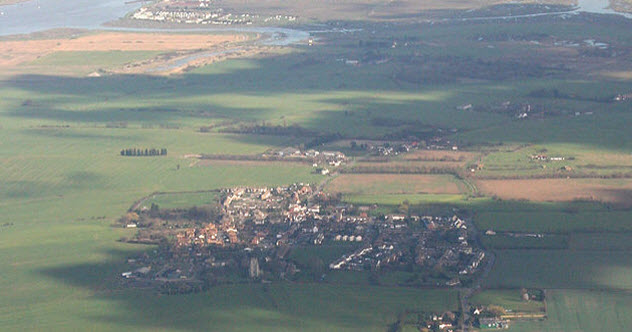
Canewdon is nestled in East Anglia, which is sometimes called England’s “witch country.” The village was once the subject of a prophecy uttered in the 19th century by James Murrell. Known as a “cunning man” (folk healer), Murrell reportedly promised that Canewdon would be full of witches for all eternity.
One of the more prosaic legends from the region states that whenever a stone falls from the tower of the local St. Nicholas Church, one witch will die and another will arrive to take her place.
Dark legends about Canewdon have circulated since at least the late 16th century. One tale claims that if you run counterclockwise around St. Nicholas Church or one of the tombs in its courtyard on Halloween, the Devil will appear.
Other versions claim that ghosts and witches will appear instead of Satan. Either way, local police are keen on keeping all merrymakers far away from St. Nicholas on Halloween.
Most of Canewdon’s legends stem from the fact that the village was the site of several witch trials and executions during the 16th and 17th centuries. The witches of Canewdon apparently used white mice as their familiars instead of black cats.
George Pickingill, one of Canewdon’s most famous magicians, was linked to black magic rituals and Devil worship before his death in the early 20th century.
2 Yarumal
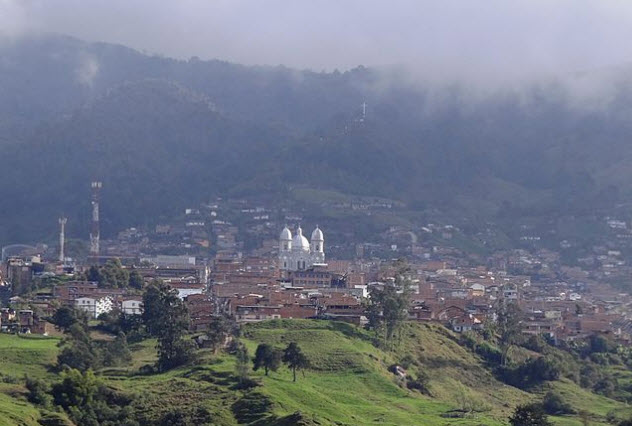
The residents of Yarumal are haunted by a curse known to science: the curse of dementia. For some reason, 50 percent of Yarumal’s 5,000 villagers will be afflicted with Alzheimer’s disease before they reach old age.
Located in Colombia’s Antioquia Department, which contains the Andes Mountains, Yarumal was once known for the type of violence that characterized Colombia in the 1980s and 1990s. Nowadays, la bobera (the “foolishness”) is what puts Yarumal in the headlines.
Most of the Yarumal residents can trace their ancestry back to the mountains of Spain’s Basque region. Unfortunately, people under 40 are known for developing Alzheimer’s disease at alarming rates.
According to scientists who have studied the town’s strange case of early-onset dementia, a Spanish conquistador in the 17th century more than likely introduced the initial genetic mutation to the people of what would become Yarumal. Known as E280A, this mutation is shared by most residents in Yarumal simply because they share large portions of the same DNA.
Researchers are confident that Yarumal holds the key to cracking dementia. As such, the mountain village has become one giant laboratory with the villagers playing the roles of patients.
1 Bhangarh
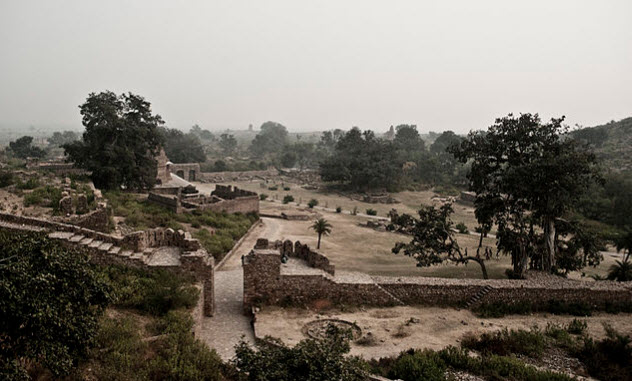
The ruins of Bhangarh in the state of Rajasthan hold a special fascination for Indians interested in the outre. Founded in 1573, Bhangarh was originally a strong, well-protected municipality during the reign of the Mughal Empire.
When the empire weakened, so did Bhangarh. By 1720, General Jai Singh II had forcefully incorporated Bhangarh into his own state of Ajabgarh. Less than 100 years later, Bhangarh was completely uninhabited after a large famine destroyed the town.
There is another version of events regarding Bhangarh’s descent into a ghost town. According to folklore, a beautiful princess once lived there. Unfortunately, one of her most devoted suitors was an evil magician who concocted a love potion to win the princess’s affection.
However, she uncovered the plan. When the magician tried to feed her from a bowl laced with the love potion, she dashed the bowl against a boulder with such force that the boulder rolled downhill and crushed the magician. Before dying, he supposedly uttered a curse on Bhangarh. He warned the residents that no one would live in the city much longer.
Although few actually believe the story of the magician and the princess, many do believe that Bhangarh is haunted. Even more people believe that roaming around the ruins of Bhangarh is a fun and spooky way to spend a Saturday night.
As a result, a sign by the Archaeology Survey of India currently stands outside the abandoned city to warn people away. In addition, despite the legend that anyone who visits Bhangarh during the night is doomed to stay in the ruined city forever, thousands of people visit there every year to see if the curse is real.
Benjamin Welton is a freelance writer based in Boston. His work has appeared in The Weekly Standard, The Atlantic, Listverse, Metal Injection, and others. He currently blogs at literarytrebuchet.blogspot.com.








